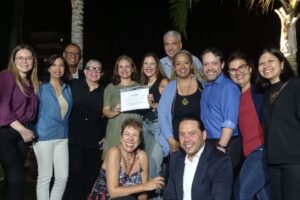Journalists from across Latin America gathered in Caracas in late June for the journalism awards presented by Venezuela’s Press and Society Institute (IPYS, for its acronym in Spanish).
Members of the jury, including journalists from Colombia, Perú, Uruguay and Venezuela discussed the challenges of reporting under authoritarian rule, the ongoing threat of disinformation and the importance of collaboration among Latin American journalists to better tell more stories.
“We should look more inward,” said journalist Fabián Werner of Uruguay prior to the IPYS Venezuela awards ceremony. “We often look to Europe or the United States to see what they’re doing in journalism, but I believe other Latin American countries should pay much more attention to what countries like Venezuela are doing.”
Venezuelan journalist María de Los Ángeles Ramírez, whose work has focused in southern Venezuela, agreed on the importance of looking inward and giving space to local stories.
“Collaboration in Venezuela has been key to reaching more audiences, to reinforce, support, and stimulate the work of small media, often located in remote areas,” she said. “Collaboration has been key to getting our stories to the whole country and beyond.”
Carlos Eduardo Huertas, director of Connectas in Colombia, which provides financial and editorial support across Latin America, knows a lot about collaboration. He says there are three key instances in which collaboration naturally happens.
The first is collaboration to attack, Huertas said. In polarized countries, human beings tend to rally to attack those they consider different. The second is collaboration to defend, which happens when people face repression or adversity and leads to a search for identity and protection. Finally, there is collaboration to build, which Huertas said has become common in investigative journalism.
“A decade ago, talking about collaboration was totally different from what it is today,” Huertas said. “Now we have high-profile examples in contemporary journalism, and collaboration is increasingly common in traditional media.”
He also emphasized the importance of collaboration not only among journalists but also between journalism and civil society. For Huertas, civil organizations should not be seen only as sources of information but as potential allies.
According to Adriana León from Peru’s Press and Society Institute, investigative journalism in Latin America has evolved along with new technologies. León, who has been part of IPYS Peru for the last 20 years, said the evolution intensified in the advent of the coronavirus pandemic.

A winner in the investigative category was “Aragua Train: Behind the Sexual Exploitation of Migrants in Latin America,” published by El Espectador and Alianza Rebelde Investiga (ARI), which includes Runrun.es, El Pitazo, and TalCual. (Photo: ARI)
“Adapting to new technologies is a great challenge because they come with disinformation,” León said. She added that new technologies also come with everyone having an opinion and something to say, or as she called it: “Hypodemia.”
Journalists in Latin America are increasingly working in more complex conditions. Low wages, difficulty achieving sustainability, attacks by authorities, violence, and exile are constants in the region.
One of the winners in the 2024 IPYS Awards was the Venezuelan news outlet Armando.info, which received first place in the investigative category. It’s the only news organization in the country entirely dedicated to investigative journalism, and has continued operating despite its journalists being investigated and forced into exile by the Venezuelan attorney general for their reporting on the business network of Alex Saab, the alleged financial manager and frontman for President Nicolás Maduro.
Patricia Marcano, with Armando.info, received a special mention for “The Law’s Hostages,” an investigation on punishment and torture of family members of the Venzuelan government’s political targets.
“These are stories that unfortunately keep happening,” Marcano said. “The point of journalism is to document and create a record so that in the future, we do not repeat these atrocious acts that have occurred and continue to occur.”
Other works awarded by IPYS Venezuela included the investigation “Lords of Gold,” published in Armando.info, Correo del Caroní, and OCCRP. The jury considered it a piece that spotlights “not only gold mining in Venezuela but also the human cost of extraction, the international connection, and the environmental impact.”
Another winner in the investigative category was “Aragua Train: Behind the Sexual Exploitation of Migrants in Latin America,” published by El Espectador and Alianza Rebelde Investiga, which includes Runrun.es, El Pitazo, and TalCual. The report stood out “for highlighting the testimonies of victims of sexual exploitation and for dynamically narrating a relevant and sensitive issue both in Venezuela and globally.”
Werner, who documents violations of freedom of expression from Uruguay through nonprofit right to information organization Cainfo, highlighted the challenges journalists face in authoritarian contexts. He said journalists must not only inform but also evangelize and educate the public.
“The journalist must do their investigation and obtain information, where there are people who do not want that information to be known,” Werner said. “And then comes the part of explaining to people who are victims of disinformation campaigns or that their government is not as wonderful as they think. Investigative journalism in our region has a social responsibility.”
He added, “This can be difficult to understand in much more democratic contexts where journalism obviously does its job but does not face the challenges and obstacles that Latin American journalists face.”